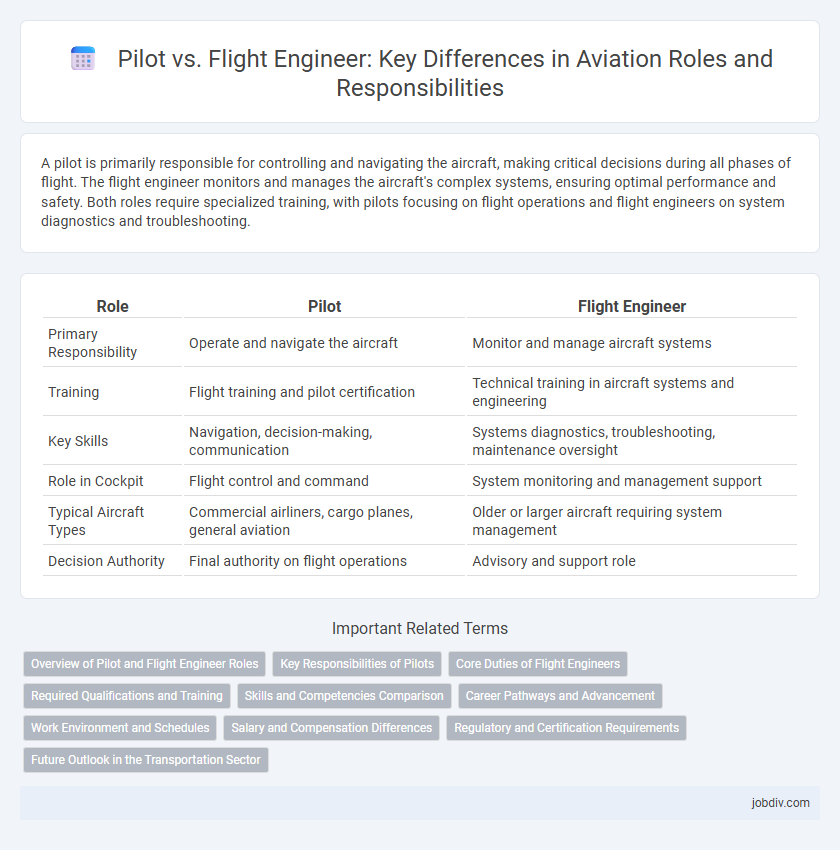A pilot is primarily responsible for controlling and navigating the aircraft, making critical decisions during all phases of flight. The flight engineer monitors and manages the aircraft's complex systems, ensuring optimal performance and safety. Both roles require specialized training, with pilots focusing on flight operations and flight engineers on system diagnostics and troubleshooting.
Table of Comparison
| Role | Pilot | Flight Engineer |
|---|---|---|
| Primary Responsibility | Operate and navigate the aircraft | Monitor and manage aircraft systems |
| Training | Flight training and pilot certification | Technical training in aircraft systems and engineering |
| Key Skills | Navigation, decision-making, communication | Systems diagnostics, troubleshooting, maintenance oversight |
| Role in Cockpit | Flight control and command | System monitoring and management support |
| Typical Aircraft Types | Commercial airliners, cargo planes, general aviation | Older or larger aircraft requiring system management |
| Decision Authority | Final authority on flight operations | Advisory and support role |
Overview of Pilot and Flight Engineer Roles
Pilots are responsible for controlling the aircraft, navigating routes, and ensuring the safety of passengers and crew during flights. Flight engineers specialize in monitoring and managing aircraft systems such as engines, fuel, and electrical components to support flight operations. Both roles require extensive technical knowledge and coordination to maintain optimal aircraft performance and safety.
Key Responsibilities of Pilots
Pilots are primarily responsible for operating aircraft, ensuring passenger safety, and navigating flight paths while maintaining communication with air traffic control. They perform pre-flight inspections, monitor aircraft systems during flight, and make critical decisions in emergency situations. Flight engineers focus on monitoring and managing the mechanical systems, allowing pilots to concentrate on flying and overall mission execution.
Core Duties of Flight Engineers
Flight engineers manage the aircraft's complex systems, including fuel, electrical, and environmental controls, ensuring optimal performance throughout the flight. They monitor instruments, diagnose technical issues, and assist pilots in maintaining safety and efficiency. Their expertise in system management distinguishes their role from pilots, who primarily focus on aircraft navigation and control.
Required Qualifications and Training
Pilots require a commercial pilot license with certifications in instrument, multi-engine, and sometimes type ratings specific to aircraft operated. Flight engineers need extensive training in aircraft systems, often including specialized technical knowledge and certification depending on the aircraft model. Both roles demand rigorous simulator training, recurrent assessments, and adherence to aviation safety standards set by regulatory authorities like the FAA or EASA.
Skills and Competencies Comparison
Pilots demonstrate advanced skills in flight path navigation, aircraft control, and real-time decision-making under pressure, ensuring safe and efficient flight operations. Flight engineers specialize in monitoring and managing complex aircraft systems, including engines, hydraulics, and electrical systems, requiring strong technical expertise and analytical competencies. Both roles demand excellent communication abilities and teamwork, but pilots emphasize leadership and situational awareness while flight engineers focus on system diagnostics and troubleshooting.
Career Pathways and Advancement
Pilots typically follow a career path starting as first officers, advancing to captains with experience and certifications, often moving into airline management or training roles. Flight engineers usually begin in junior technical positions, progressing to senior flight engineer roles before transitioning into aircraft maintenance management or safety inspection careers. Both pathways demand rigorous training, specialized knowledge, and continuous skill development to achieve advancement in the aviation industry.
Work Environment and Schedules
Pilots typically work in highly regulated environments on commercial, cargo, or private aircraft with strict adherence to Federal Aviation Administration (FAA) regulations and standardized flight schedules. Flight engineers often operate in older aircraft models or specialized flights, managing complex mechanical systems while coordinating closely with pilots under varying shift patterns that can include irregular hours and extended duty periods. Both roles demand adaptability to dynamic conditions, but pilots generally have more predictable schedules due to modern flight automation and airline scheduling frameworks.
Salary and Compensation Differences
Pilots typically earn higher salaries than flight engineers due to their greater responsibilities in commanding aircraft and making critical flight decisions. According to industry data, average annual pilot salaries range from $80,000 to over $200,000 depending on experience and airline, whereas flight engineers earn between $50,000 and $100,000. Compensation packages for pilots often include bonuses, profit-sharing, and per diem allowances that further widen the earnings gap between the two roles.
Regulatory and Certification Requirements
Pilots must obtain an Airline Transport Pilot (ATP) certificate issued by the Federal Aviation Administration (FAA), which involves rigorous training, flight hours, and passing written and practical exams. Flight engineers require certification through the Aircraft Maintenance Technician (AMT) program or specific type ratings under FAA regulations, emphasizing mechanical and system knowledge rather than direct flight operations. Regulatory standards mandate continuous recurrent training and medical certification for pilots, while flight engineers must stay updated with maintenance procedures and system manuals to ensure compliance with aviation safety rules.
Future Outlook in the Transportation Sector
The future outlook for pilots and flight engineers in the transportation sector is shaped by advancements in automation and artificial intelligence, leading to increased reliance on automated systems. While pilots will continue to play a critical role in decision-making and emergency management, flight engineers may see their traditional roles evolve or diminish as integrated avionics systems reduce the need for manual system monitoring. The transportation industry is prioritizing cross-training and upskilling to prepare professionals for emerging technologies and ensure safety in increasingly complex aircraft operations.
Pilot vs Flight Engineer Infographic

 jobdiv.com
jobdiv.com